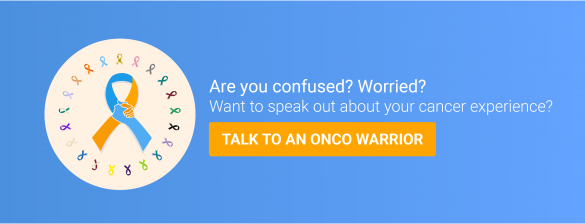Cancer tends to test your limits. While you will have to face some of the struggles on your own, you might find that having a circle of friends and family to help you at this time can speed up your recovery process.
A support system is essentially a network of people you can turn to, for both emotional and practical help. These could be the people you live with, or work with, or even school friends or neighbours.
Anyone who is willing to help you in whatever way they can, becomes a part of your support system.
In our culture, we tend to look down on asking for help and prefer to be self-sufficient. But a support system is mutually beneficial. The others support you in your time of need, and you in turn are expected to be there for them when they need you.

Do I need a support system?
Everyone benefits from a support system. Those dealing with cancer, more so.
During cancer, the entire caregiving is usually left to a single person. This could be a spouse, a parent, an off-spring or a sibling. Since cancer treatment and care tends to last for many months, sometimes years, a single caregiver can become insufficient.
Having multiple people you can turn to, who can provide encouragement, time and care, in turns, might prove more effective. This will also prevent caregiver burnout.
Research shows that having a support system improves your overall health, reduces anxiety during cancer, helps you manage stress and even depression. Furthermore, it opens you up to different ideas and solutions, as more minds are better than one.
Different people in your support system may be willing to contribute to your life in different ways. While those closest to you might be willing to take care of you on a daily basis, others might be able to only spend an hour a week with you.
In spite of the size of their contribution, they might be a valuable part of your support system. Even little things like a funny phone conversation, or a small but thoughtful gift can lift your spirits when you most need it.
How do I build a support system?
If you realise that you have very few friends you can turn to in your hour of need, you might want to work on expanding your circle.
Here are some ways of creating and maintaining a support system:
Step 1: Treat people well
They say the key to having a friend is being a friend. If you are expecting people to cheer you up, listen to you, help you out etc, you will have to make it a habit to do the same for them.
It’s probably not easy to be there for others while you are facing cancer and the effects of the treatment. But there will still be small things that you do, that will mean a lot to someone. For example, a word of appreciation to your caregiver might make them feel valued.
Step 2: Join a support group
A cancer support group will introduce you to a lot of people who are going through what you are. It’s the best place to start making friends as you don’t need to worry about how you will inform them of your cancer or what they will think about it.
Onco.com’s cancer support group Talk Your Heart Out conducts online sessions where a survivor, cancer patient or caregiver shares their own journey. Listening to how someone else faced this struggle might inspire you to do the same.
You can read more about why you need to join a support group here.
In this video, you can listen to Amit Dubey, a leukemia survivor, and the speaker at our most recent support circle sharing notes about how he manages his mental and physical fitness.
You can read more about Amit’s cancer journey here.
Step 3: Learn to accept help
Often you may find that there are people who are willing to help you and be there for you. For many of us, accepting help is not easy. We look upon it as a sign of weakness, when in fact, it takes a lot of strength to know that you need help and take it.
If someone is willing to help you collect your medicines or groceries, let them. Someone else might be eager that you join their online club, while someone else might want to discuss their problem with you. Leaving the channels of communication open, allows them to reach you and over time these interactions turn into bonds.
Step 4: Say ‘no’
While it’s important to have a support system, you don’t have to put up with people who make you feel bad. If someone has a negative attitude and your conversations are leaving you feeling low, feel free to put a distance between them and yourself.
Learning to respect wishes and boundaries, both theirs and your own, is an important part of having a fulfilling interaction. Avoid feeling guilty about saying ‘no’ when you feel the need to.
Do you have a support system? Tell us how to maintain it in the comments section.



